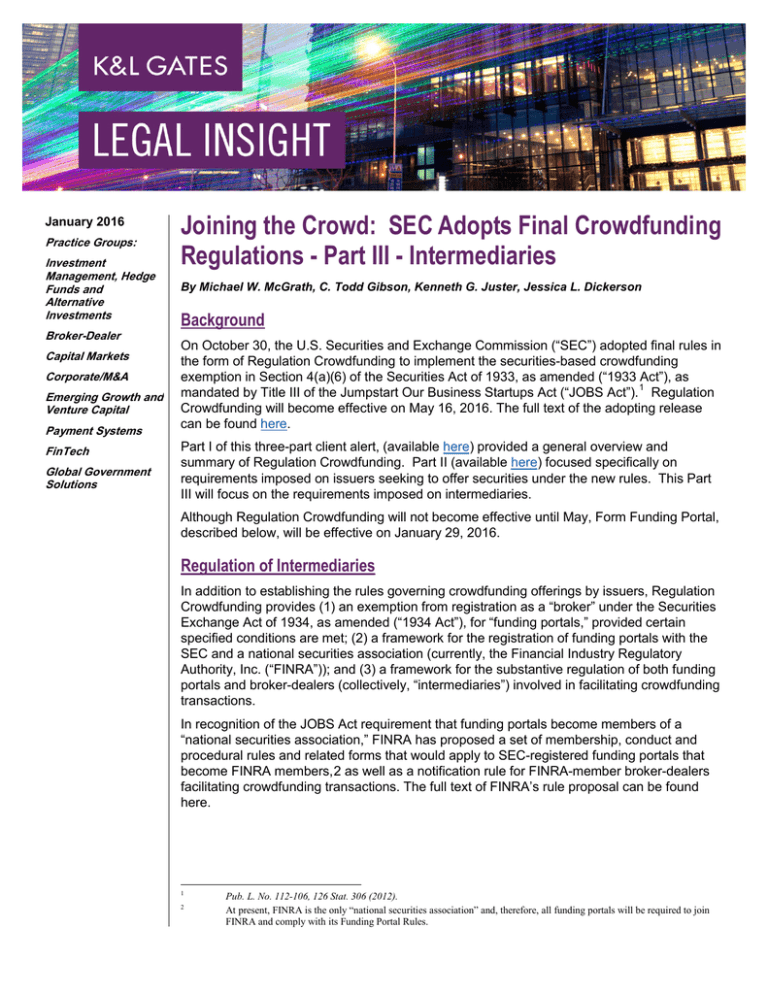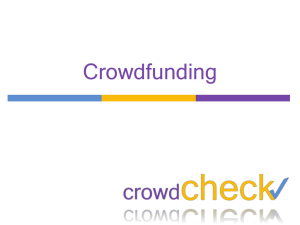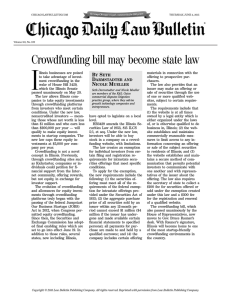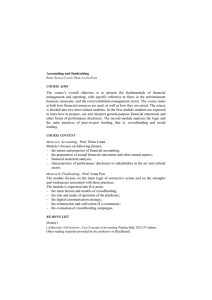
January 2016
Practice Groups:
Investment
Management, Hedge
Funds and
Alternative
Investments
Broker-Dealer
Capital Markets
Corporate/M&A
Emerging Growth and
Venture Capital
Payment Systems
FinTech
Global Government
Solutions
Joining the Crowd: SEC Adopts Final Crowdfunding
Regulations - Part III - Intermediaries
By Michael W. McGrath, C. Todd Gibson, Kenneth G. Juster, Jessica L. Dickerson
Background
On October 30, the U.S. Securities and Exchange Commission (“SEC”) adopted final rules in
the form of Regulation Crowdfunding to implement the securities-based crowdfunding
exemption in Section 4(a)(6) of the Securities Act of 1933, as amended (“1933 Act”), as
mandated by Title III of the Jumpstart Our Business Startups Act (“JOBS Act”). 1 Regulation
Crowdfunding will become effective on May 16, 2016. The full text of the adopting release
can be found here.
Part I of this three-part client alert, (available here) provided a general overview and
summary of Regulation Crowdfunding. Part II (available here) focused specifically on
requirements imposed on issuers seeking to offer securities under the new rules. This Part
III will focus on the requirements imposed on intermediaries.
Although Regulation Crowdfunding will not become effective until May, Form Funding Portal,
described below, will be effective on January 29, 2016.
Regulation of Intermediaries
In addition to establishing the rules governing crowdfunding offerings by issuers, Regulation
Crowdfunding provides (1) an exemption from registration as a “broker” under the Securities
Exchange Act of 1934, as amended (“1934 Act”), for “funding portals,” provided certain
specified conditions are met; (2) a framework for the registration of funding portals with the
SEC and a national securities association (currently, the Financial Industry Regulatory
Authority, Inc. (“FINRA”)); and (3) a framework for the substantive regulation of both funding
portals and broker-dealers (collectively, “intermediaries”) involved in facilitating crowdfunding
transactions.
In recognition of the JOBS Act requirement that funding portals become members of a
“national securities association,” FINRA has proposed a set of membership, conduct and
procedural rules and related forms that would apply to SEC-registered funding portals that
become FINRA members,2 as well as a notification rule for FINRA-member broker-dealers
facilitating crowdfunding transactions. The full text of FINRA’s rule proposal can be found
here.
1
2
Pub. L. No. 112-106, 126 Stat. 306 (2012).
At present, FINRA is the only “national securities association” and, therefore, all funding portals will be required to join
FINRA and comply with its Funding Portal Rules.
Joining the Crowd: SEC Adopts Final Crowdfunding Regulations Part III - Intermediaries
Funding Portals
Exemption from Broker Registration
Section 4(a)(6)(C) of the 1933 Act requires that all crowdfunding transactions be conducted
through either: (i) an SEC-registered broker; or (ii) a funding portal, a newly created category
of intermediary under the federal securities laws. A funding portal is not required to register
with the SEC as a broker, and it is subject to significantly fewer regulatory obligations that
registered brokers. However, the activities in which funding portals may to engage are also
significantly limited.
Specifically, a funding portal may not:
• Offer investment advice or recommendations;
• Solicit purchases, sales or offers to buy the securities offered or displayed on its website
or portal;
• Compensate employees, agents or other persons for such solicitation or based on the
sale of securities displayed or referenced on its website or portal; or
• Hold, manage, possess or otherwise handle investor funds or securities.
Rule 401 of Regulation Crowdfunding provides that a funding portal limiting its activities in
this manner is exempt from registration with the SEC as a broker, provided the funding portal
(1) remains subject to the examination, enforcement and other rulemaking authority of the
SEC;3 (2) is a member of a national securities association (currently, FINRA); and (3) is
subject to other requirements that the SEC deems appropriate.
Safe Harbor for Crowdfunding Activities
To provide additional clarity regarding the activities in which a funding portal may engage
without registering with the SEC as a broker, the SEC provided a nonexclusive safe harbor
for certain activities described in Rule 402 of Regulation Crowdfunding. Like other SEC safe
harbors, no presumption will arise that a funding portal has violated the 1934 Act or
Regulation Crowdfunding if it fails to conform its activities to Rule 402, and the anti-fraud
provisions of the federal securities laws continue to apply to the activities described in the
safe harbor. A brief description of the activities that fall within this safe harbor is included as
Appendix A to this alert.
Registration and Securities Association Membership
To register with the SEC, a funding portal must first complete Form Funding Portal, a
registration form similar to, but less extensive than, the Form BD used by broker-dealers.
Form Funding Portal consists of eight sections, including items relating to: identifying
information of the funding portal and its control persons, disclosure information, nonsecurities-related businesses, and escrow and compensation arrangements. Funding portals
must amend Form Funding Portal within 30 days of any of the information on the form
becoming inaccurate, and they must promptly file a withdrawal of registration upon ceasing
funding portal operations. Each of these filings must be made through the SEC’s EDGAR
3
Additionally, Rule 403 of Regulation Crowdfunding requires funding portals to permit the examination and inspection of their
activities that relate to funding portal business by the SEC and FINRA, including their premises, systems, platforms and records.
2
Joining the Crowd: SEC Adopts Final Crowdfunding Regulations Part III - Intermediaries
system, and the Form will be made immediately accessible and searchable by the public
(with the exception of certain personally identifiable information). Funding portals also must
become members of FINRA, as discussed below. A funding portal’s registration with the
SEC will become effective on the later of: (1) 30 calendar days after the date that Form
Funding Portal is received by the SEC; or (2) the date the funding portal is approved for
membership in FINRA.
Compliance Obligations
Regulation Crowdfunding imposes several compliance obligations on funding portals that
mirror those imposed on registered broker-dealers.
For example, funding portals are required to:
• Implement written policies and procedures relating to their business as funding portals
that are reasonably designed to achieve compliance with federal securities laws and the
rules and regulations thereunder;
• Comply with SEC privacy regulations, including Regulation S-P (Privacy of Consumer
Financial Information and Safeguarding Personal Information), Regulation S-AM
(Limitations on Affiliate Marketing), and Regulation S-ID (Identity Theft Red Flags); and
• Make and preserve certain books and records for five years, and produce them promptly
to representatives of the SEC and FINRA.
The SEC determined not to adopt anti-money laundering (“AML”) requirements under
Regulation Crowdfunding, instead deferring to the Financial Crimes Enforcement Network
(“FinCEN”) within the Department of the Treasury to determine how best to implement the
Bank Secrecy Act with respect to funding portals. The SEC noted in its adopting release that
FinCEN has stated that it will propose regulations under the Bank Secrecy Act to address
funding portals. The SEC also decided not to impose any licensing, testing or qualification
requirements on associated persons of funding portals, instead deferring to FINRA to
determine whether any such requirements are warranted.
Nonresident Funding Portals
Regulation Crowdfunding contains special provisions for the registration of “nonresident
funding portals,” which are those incorporated in or organized under the laws of a non-U.S.
jurisdiction, or having a principal place of business in any place not in the U.S. or its
territories. Registration of a nonresident funding portal is conditioned on:
• There being an information sharing arrangement in place between the SEC and the
competent regulator in the applicable non-U.S. jurisdiction;
• The nonresident funding portal providing a written consent and power of attorney
appointing an agent for service of process in the U.S., and furnishing the SEC with the
name and address of such agent on Schedule C of Form Funding Portal;
•
The nonresident funding portal certifying on Schedule C of Form Funding Portal and
providing an opinion of counsel that it can, as a matter of law, provide SEC and FINRA
with prompt access to its books and records and can, as a matter of law, submit to onsite
inspection and examination by the SEC and FINRA.
3
Joining the Crowd: SEC Adopts Final Crowdfunding Regulations Part III - Intermediaries
While a nonresident funding portal is required to have an agent for the service of process in
the U.S., it is not required to have a resident legal representative to handle any matters
between the portal and issuers or investors.
FINRA Funding Portal Rules
As discussed above, all intermediaries involved in facilitating crowdfunding transactions,
whether registered broker-dealers or funding portals, are required to become members of
FINRA. In recognition of the limited scope of activities in which funding portals are permitted
to engage, FINRA has determined not to subject funding portals to its full set of rules and
regulations. 4 Rather, FINRA has proposed a set of streamlined rules and related forms
designed specifically for funding portals (the “Funding Portal Rules”). 5 The Funding Portal
Rules are summarized below.
• Membership Application: The Funding Portal Rules provide for a streamlined membership
application process (i.e., FINRA will have 60 days to render a decision, rather than 180
days for broker member applications) and reduce the 14 standards for admission of
broker-dealer members down to five: 1) ability to comply with applicable federal securities
laws, rules and regulations and FINRA’s Funding Portal Rules; 2) contractual or other
arrangements and business relationships necessary to initiate operations; 3) supervisory
system; 4) direct and indirect funding sources; and 5) recordkeeping system.
• Anti-Fraud: Funding portals must observe high standards of commercial honor and just
and equitable principles of trade, provide that no funding portal member shall effect any
transaction in security by means of any manipulative, deceptive or other fraudulent
device, and establish basic content standards for funding portal communications, such as
prohibiting false, exaggerated, unwarranted, promissory or misleading statements or
claims.
• Supervisory System: The rules require a funding portal member to establish and maintain
a system to supervise each associated person’s activities in a manner reasonably
designed to achieve compliance with applicable securities laws, regulations and the
Funding Portal Rules, including the establishment and maintenance of written procedures
to supervise the activities of the funding portal and its associated persons, the designation
of a person with authority to carry out the supervisory responsibilities of the funding portal
member and reasonable efforts to determine that all supervisory personnel are qualified
by virtue of experience or training to carry out their assigned responsibilities.
• Examination: A funding portal member must permit the examination and inspection of all
its businesses and business operations relating to its activities as a funding portal, such
as its premises, systems, platforms and records, by representatives of FINRA and the
SEC, and must cooperate with the examination, inspection or investigation of any persons
directly or indirectly using its platform.
• Regulatory Disclosure: Funding portal members must report to FINRA: regulatory
proceedings, disciplinary and other events; determinations that the funding portal or its
associated persons have violated investment-related laws, rules and regulations; and the
4
Section 3(h)(2) of the Exchange Act, as amended by the JOBS Act, requires that FINRA only examine for, and enforce against,
registered funding portals rules that FINRA has written specifically for registered funding portals.
5
See Financial Industry Regulatory Authority, Inc.; Notice of Filing of a Proposed Rule Change To Adopt the Funding Portal Rules
and Related Forms and FINRA Rule 4518 ([Release No. 34–76239; File No. SR–FINRA–2015–040).
4
Joining the Crowd: SEC Adopts Final Crowdfunding Regulations Part III - Intermediaries
member’s gross revenue, prepared in accordance with accounting principles generally
accepted in the United States of America, on Form FP-Statement of Revenue, no later
than 60 calendar days following each calendar year end.
• Discipline and Dispute Resolution: Funding portals will be subject to the FINRA Rule 8000
series rules (Investigations and Sanctions), the FINRA Rule 9000 series rules (Code of
Procedure), the FINRA Rule 12000 series rules (Code of Arbitration Procedure for
Customer Disputes), the FINRA Rule 13000 series rules (Code of Arbitration Procedure
for Industry Disputes) and the FINRA Rule 14000 series rules (Code of Mediation
Procedure).
In addition, to enable FINRA to keep accurate track as to which of its registered broker
members, if any, facilitate crowdfunding transactions, FINRA has proposed to adopt new
FINRA Rule 4518, which would require registered broker members of FINRA that intend to
act as intermediaries in crowdfunding transactions to notify FINRA prior to engaging, for the
first time, in a transaction involving the offer or sale of securities in reliance on Section
4(a)(6) of the Securities Act; or within 30 days of directly or indirectly controlling, or being
controlled by or under common control with, a funding portal.
The proposed Funding Portal Rules and proposed Rule 4518 are currently pending with the
SEC, with a deadline for SEC action on the proposals of January 26, 2016.
Substantive Regulation of Intermediaries under Regulation Crowdfunding
In addition to the registration rules for funding portals, Regulation Crowdfunding establishes
substantive regulations for all intermediaries involved in facilitating crowdfunding
transactions, whether funding portals or registered broker-dealers.
Compensation and Financial Interests
Regulation Crowdfunding prohibits an intermediary from providing services to any issuer in
which the intermediary’s directors, officers or partners (or any person occupying a similar
status or performing a similar function) have a financial interest. A “financial interest” is
defined as direct or indirect ownership of, or economic interest in, any class of the issuer’s
securities. Such persons also may not receive a financial interest in the issuer as
compensation for services provided to, or for the benefit of, the issuer.
However, the SEC recognized that many small issuers may not have sufficient liquid capital
to compensate intermediaries for services. Accordingly, Regulation Crowdfunding permits
an intermediary (but not, as noted above, its directors, officers or partners) to receive a
“financial interest” in an issuer as compensation for the services provided to, or on behalf of,
the issuer in connection with the offer or sale of the issuer’s securities in a crowdfunding
transaction through the intermediary’s platform, provided that the financial interest is of the
same class and has the same terms, conditions and rights as the securities being offered or
sold on the platform. There are no limitations on the amount or structure of cash
compensation to be paid to intermediaries, but all forms of compensation are subject to
certain disclosure requirements discussed below.
5
Joining the Crowd: SEC Adopts Final Crowdfunding Regulations Part III - Intermediaries
Measures to Reduce the Risk of Fraud
Section 4A(a)(5) of the 1933 Act requires intermediaries to take such measures to reduce
the risk of fraud in crowdfunding transactions as the SEC establishes by rule. To implement
this statutory provision, the SEC established the following anti-fraud measures under
Regulation Crowdfunding:
• Issuer Compliance: An intermediary must have a “reasonable basis” for believing that an
issuer seeking to offer and sell securities in a crowdfunding transaction complies with the
requirements of Section 4A(b) of the 1933 Act (discussed in Part II of this series of alerts).
In the absence of red flags, an intermediary may reasonably rely on the representations
of the issuer that it is in compliance.
• Records of Securities Holders: An intermediary must have a “reasonable basis” for
believing that an issuer has established means to keep accurate records of the holders of
the securities it would offer through the intermediary’s platform. Again, in the absence of
red flags, an intermediary may rely on the representations of the issuer concerning its
means of recordkeeping. An intermediary will also be deemed to have satisfied this
requirement if the issuer has engaged the services of a registered transfer agent.
• Denial of Platform Access — Disqualification: An intermediary must deny access to its
platform if the intermediary has a “reasonable basis” for believing that an issuer, or any of
its officers, directors (or any person occupying a similar status or performing a similar
function) or any 20% beneficial owner of the issuer, is subject to disqualification under
Rule 503 of Regulation Crowdfunding. The intermediary is required to conduct a
background and securities enforcement regulatory history check on each of such person,
and although the SEC did not prescribe specific procedures for these reviews, it noted its
belief that “an intermediary’s interest in developing a successful platform will motivate it to
conduct rigorous background checks.”
•
Denial of Platform Access — Investor Protection: An intermediary is required to deny
access to its platform if it has a “reasonable basis” for believing that: (i) the issuer or
offering presents the potential for fraud or otherwise raises concerns about investor
protection or (ii) it is unable to adequately or effectively assess the risk of fraud of the
issuer or its offering. Further, if an intermediary becomes aware of information after it has
granted access that causes it to reasonably believe that the issuer or the offering
presents the potential for fraud or raises investor protection concerns, it must promptly
remove the offering from its platform, cancel the offering and return any investor funds
that may have been committed.
Account Opening and Educational Materials
The SEC elected not to prescribe particular requirements for account opening in Regulation
Crowdfunding, instead allowing intermediaries to determine what information and records
they require to comply with applicable regulations. However, in light of the fact that
crowdfunding transactions are required to occur exclusively through an intermediary’s
platform, Regulation Crowdfunding does require that investors consent to electronic delivery
of materials in connection with crowdfunding transactions. Therefore, intermediaries may not
accept an investment commitment in a crowdfunding transaction from any customer
(including an existing customer) that has not consented to electronic delivery of offering
materials and other information relating to the crowdfunding offering.
6
Joining the Crowd: SEC Adopts Final Crowdfunding Regulations Part III - Intermediaries
In addition, intermediaries are required to provide to investors, at account opening,
educational materials written in plain language and designed to communicate certain
specified information regarding crowdfunding transactions, including:
• How crowdfunding transactions work, including investors’ cancellation rights;
• The risks associated with investing in securities sold in crowdfunding transactions;
• The types of securities that may be sold on the intermediary’s platform and their
associated risks;
• Restrictions on resale;
• The types of information issuers are required to provide, and the fact that issuers may
cease to publish annual reports;
• Limits on the amounts investors may invest; and
•
The lack of an ongoing relationship between the issuer and intermediary after the offering
ends.
Each intermediary has the flexibility to determine the form and content of the educational
materials, provided the minimum standards of Rule 302(b) of Regulation Crowdfunding are
satisfied. Further, an intermediary is required to keep its educational materials current and,
prior to accepting an investment commitment from an investor, obtain a representation from
the investor that he or she has reviewed the intermediary’s most recent educational
materials.
Investor Qualification and Representations
Section 4(a)(6) of the 1933 Act imposes limits on the aggregate amount of securities that can
be sold to an investor in reliance on the exemption during a 12-month period. Accordingly,
Regulation Crowdfunding requires an intermediary, each time it accepts an investment
commitment on its platform, to have a “reasonable basis” for believing that the investor
satisfies the applicable limits. In the absence of red flags, the intermediary would be
permitted to satisfy this obligation by relying on an investor’s representations regarding
annual income, net worth and the amount of the investor’s other investments in securities
sold in crowdfunding transactions through other intermediaries. While an intermediary is not
required to monitor and independently verify the accuracy of the investor’s self-certification, it
may not ignore investments made by the investor in other offerings on the intermediary’s
platform or on other platforms that are controlled by or under common control with the
intermediary. Intermediaries are specifically permitted to rely on a central data repository of
investor information, should one be created in the future.
In addition to qualifying an investor with respect to investment limits, an intermediary must
obtain, each time before accepting an investment commitment, a representation from the
investor that: (1) the investor has reviewed the intermediary’s educational materials, (2) the
investor understands that the entire amount of his or her investment may be lost and (3) the
investor is in a financial condition to bear the complete loss of the investment. The
intermediary must also obtain from the investor a questionnaire that demonstrates the
investor’s understanding of these risks, as well as the restrictions on the investor’s ability to
cancel an investment commitment and that it may be difficult to resell the securities.
7
Joining the Crowd: SEC Adopts Final Crowdfunding Regulations Part III - Intermediaries
Issuer Information
As discussed in Part II of this series of alerts, issuers must file with the SEC, and make
available to intermediaries and investors, certain specified information about the issuer, its
financial condition and the offering. To ensure the broad dissemination of this information
and provide investors with adequate time to evaluate the offering, Regulation Crowdfunding
requires an intermediary to make this information publicly available on its platform (in a
manner that permits users to save, download or otherwise store it) a minimum of 21 days
before any securities are sold in the offering. The intermediary must maintain the public
availability of the information until the offer and sale of securities is completed or cancelled,
and it may not require any person to establish an account with the intermediary in order to
access the information. An intermediary is not, however, required to ensure that an investor
has actually reviewed the relevant issuer information prior to purchasing securities in the
offering.
Communication Channels
Regulation Crowdfunding requires an intermediary to provide a communications channel on
its platform through which investors may interact with each other and with representatives of
the issuer. The communication channel must be available for public viewing, but the ability to
post on the channel must be limited to persons who have opened accounts on the platform.
In addition, while investors may interact with each other off the platform, all communications
between investors and the issuer about the terms of the offering must occur through the
intermediary’s communication channel to ensure transparency and accountability.
Because they are prohibited from offering advice or recommendations, funding portals are
prohibited from participating in these communication channels, but they may establish
guidelines for communication (such as length or size of individual postings) and remove
abusive or potentially fraudulent content. By contrast, a registered broker-dealer may
participate in communications channels included in their crowdfunding platforms, subject to
compliance with FINRA rules regarding, among other things, suitability and communications
with the public. Finally, an intermediary must require a person posting on the channel to
clearly disclose with each posting whether he or she is a founder or employee of an issuer
engaging in promotional activities on behalf of the issuer, or receives compensation to
promote the issuer’s offering.
Requirements for Crowdfunding Transactions
Regulation Crowdfunding also lays out a set of procedural requirements that apply to the
execution of crowdfunding transactions, as follows:
• Notice of Investment Commitment: Upon receipt of an investment commitment from an
investor, an intermediary is required to promptly provide the investor with a written record
of the basic terms of the transaction (including the name of the issuer, the dollar amount
of the commitment, and the price of the securities, if known) and a reminder of the date
and time by which the investor may cancel the commitment.
• Maintenance and Transmission of Funds: An intermediary that is a registered brokerdealer is required to comply with 1934 Act Rule 15c2-4 for the maintenance and
transmission of investor funds, which generally requires that such funds be deposited in a
separate bank account until the appropriate event or contingency has occurred, and
8
Joining the Crowd: SEC Adopts Final Crowdfunding Regulations Part III - Intermediaries
thereafter be promptly transmitted or returned to the persons entitled thereto.
Alternatively, such funds could be transmitted to a bank that has agreed to act as escrow
agent.
An intermediary that is a funding portal must direct investors to transmit money or other
consideration directly to a “qualified third party” that has agreed in writing to hold the
funds for the benefit of the investors and the issuer and to promptly transmit or return the
funds at the appropriate time to the persons entitled to such funds. A “qualified third
party” is a registered broker-dealer that carries customer accounts, a bank, or a credit
union.
• Confirmations: An intermediary is required, at or before the completion of a crowdfunding
transaction, to provide each investor with a confirmation of the transaction containing
certain specified information. The confirmation terms under Regulation Crowdfunding
Rule 303(f)(2) are similar to, but not as extensive as, those under 1934 Act Rule 10b-10.
Further, an intermediary that sends a Rule 303(f)(2) confirmation for a crowdfunding
transaction is exempt from Rule 10b-10 with respect to that transaction.
•
Completion of Offerings, Cancellations and Reconfirmations: Rule 304(a) of Regulation
Crowdfunding provides investors with an unconditional right to cancel an investment
commitment for any reason until 48 hours prior to the deadline identified in the issuer’s
offering materials. An issuer that has reached the target offering amount prior to the
stated deadline may close the offering early, provided that: (1) the offering had been open
for at least 21 days, (2) the intermediary provided at least five business days’ advance
notice of the new offering deadline, (3) investors are given the ability to cancel until 48
hours prior to the new deadline and (4) at the time of the new deadline, the issuer
continued to meet or exceed the target offering amount. In addition, if there is a material
change to the terms of an offering or the information provided by the issuer about the
offering, an intermediary must send to any investors who have made a commitment a
notice of the change, stating that such commitment will be cancelled unless the investor
reconfirms his or her commitment within five business days of receipt of the notice.
Finally, if an issuer does not complete an offering, the intermediary must, within five
business days, (a) send notification to each investor who made an investment
commitment, (b) direct the refund of investor funds and (c) prevent investors from making
investment commitments for that offering on the intermediary’s platform.
Promoters, Compensation Disclosure and Payments to Third Parties
Section 4A(b)(3) of the 1933 Act prohibits an issuer from compensating any person for
promoting its crowdfunding offering unless the issuer ensures that the promoter clearly
discloses such compensation. To help ensure that investors are aware of this requirement,
Regulation Crowdfunding requires intermediaries to inform investors, at account opening,
that promoters are subject to this disclosure requirement. In addition, intermediaries must
require any person, when participating in the required communication channels, to clearly
disclose with each posting whether he or she is engaging in promotional activities on behalf
of the issuer, or receives compensation from the issuer.
Intermediaries are also required to disclose to investors, at account opening, the manner in
which they will be compensated in connection with crowdfunding transactions, including
whether the intermediary may be compensated with financial interests in the issuer’s
securities.
9
Joining the Crowd: SEC Adopts Final Crowdfunding Regulations Part III - Intermediaries
Finally, Regulation Crowdfunding restricts intermediaries from compensating any person for
providing the intermediary with the personally identifiable information of any investor in a
crowdfunding offering. However, an intermediary may pay a person a flat fixed fee to
advertise the intermediary’s platform or direct persons to the intermediary’s platform through
hyperlinks or search term results.
Statutory Liability
In setting the scope of statutory liability for transactions made in reliance on Section 4(a)(6),
the 1933 Act defines an issuer to include “any person who offers or sells the security in such
offering.” In the proposing release, the SEC noted that it appears likely that intermediaries
would be considered issuers for purposes of this liability provision. In the adopting release,
the SEC clarified its belief that the determination of “issuer” liability will be based on the facts
and circumstances in a particular matter and that an intermediary has a defense to any such
liability if it did not know, and in the exercise of reasonable care could not have known, of the
applicable fraud or omission. To demonstrate the exercise of reasonable care, the SEC
suggested an intermediary could take certain steps, such as establishing policies and
procedures reasonably designed to achieve compliance with Regulation Crowdfunding and
conducting a review of issuer offering documents before posting them to the intermediary’s
platform to evaluate whether they contain materially false or misleading information.
Disqualification
Rule 503(d) of Regulation Crowdfunding disqualifies any person subject to a statutory
disqualification, as defined in the 1934 Act, from acting as, or being an associated person of,
an intermediary unless otherwise permitted to do so by SEC rule or order. It also provides
that all associated persons of intermediaries are subject to the fingerprinting requirements of
1934 Act Rule 17f-2.
Next Steps and How We Can Help
The much-anticipated Regulation Crowdfunding will officially be available to the “crowd” on
May 16, 2016, but Form Funding Portal will be effective much sooner, on January 29, 2016,
which should allow sufficient time for funding portals to register with the SEC and establish
the necessary infrastructure to prepare for crowdfunding activities. The SEC adopting
release and FINRA Funding Portal Rule proposal outline in detail the rules and regulations
applicable to intermediaries that intend to facilitate transactions pursuant to the new Section
4(a)(6) crowdfunding exemption. These rules and regulations contain numerous disclosure
and procedural requirements, and although the new rules will not be fully effective for several
months, interested parties should familiarize themselves with the rules and start planning
now, particularly those interested parties who intend to register as funding portals.
If you have any questions about the new rules, their potential benefits to you, or any other
matters related to raising capital or facilitating capital raises in the public and private
securities markets, please contact any of the authors listed below.
10
Joining the Crowd: SEC Adopts Final Crowdfunding Regulations Part III - Intermediaries
Appendix A
Rule 402 Safe Harbor Activities
Rule
Activity
Comments
402(b)(1)
Limiting offerings
A funding portal may determine whether and under what
terms to allow an issuer to offer and sell securities in a
crowdfunding transaction through its platform. However,
a funding portal remains restricted from providing
investment advice or recommendations and, therefore,
may not represent that the offerings on its platform are
safer or better investments than those on other
platforms, or that its offerings are “investment worthy.”
402(b)(2)
Highlighting
issuers and
offerings
A funding portal may highlight particular issuers or
offerings on its platform based on objective criteria
where the criteria are reasonably designed to highlight a
broad selection of issuers, are applied consistently to all
issuers and offerings and are clearly displayed on the
funding portal’s platform. A funding portal may not
receive any special or additional compensation for
highlighting (or offering to highlight) issuers or offerings
on its platform.
402(b)(3)
Providing search
functions
A funding portal may provide search functions or other
tools that allow users to search, sort or categorize
available offerings according to objective criteria. The
search criteria may not include the advisability of
investing in the offering, or an assessment of any
characteristic of the issuer, its business plan, its
management or risks associated with an investment. In
addition, a funding portal may allow users to rate
offerings (for example, using a star rating system) and
search using those ratings, as long as the funding portal
does not participate in the rating process.
11
Joining the Crowd: SEC Adopts Final Crowdfunding Regulations Part III - Intermediaries
402(b)(4)
Providing
communication
channels
Rule 303(c) requires a funding portal to provide
communication channels on its platform through which
investors can communicate with each other and with
representatives of the issuer. Rule 402(b)(4) of the safe
harbor specifies that a funding portal may not participate
in those communications, except to establish guidelines
about communication and remove abusive or potentially
fraudulent communications.
Under this rule, the
communication channel must be available to the general
public, but the ability to post comments must be limited
to those who have accounts on the platform. Further,
the funding portal must require each poster to disclose
on each posting whether he or she is a founder or an
employer of an issuer engaging in promotional activities
on behalf of the issuer, or is or will be otherwise
compensated for promoting an issuer.
402(b)(5)
Advising issuers
A funding portal may advise an issuer about the
structure or content of the issuer’s offering, including
preparing offering documents. For example, a funding
portal may provide pre-drafted templates or forms for an
issuer to use in its offering, and may provide advice
about the types of securities the issuer can offer, the
terms of those securities and the procedures and
regulations associated with crowdfunding.
402(b)(6)
Paying for referrals
A funding portal may compensate a third party for
referring a person to the funding portal if: (a) the third
party does not provide the funding portal with personally
identifiable information about any investor and (b) except
if the third party is a registered broker-dealer, the
compensation is not based, directly or indirectly, on the
purchase or sale of a security in a crowdfunding
transaction on the funding portal’s platform. The SEC
will look to its long-established history of guidance in
determining whether any compensation is transactionbased for purposes of this rule.
402(b)(7)
Payment of
compensation to
registered brokerdealers
A funding portal may pay compensation to a registered
broker-dealer for services, including for referring a
person to the funding portal, in connection with a
crowdfunding transaction provided that: (i) the services
are provided pursuant to a written agreement, (ii) the
compensation
is
permitted
under
Regulation
Crowdfunding and (iii) the compensation complies with
FINRA rules.
12
Joining the Crowd: SEC Adopts Final Crowdfunding Regulations Part III - Intermediaries
402(b)(8)
Receipt of
compensation from
registered brokerdealers
A funding portal may provide services to, and receive
compensation from, a registered broker-dealer in
connection with a crowdfunding transaction provided
that: (i) the services are provided pursuant to a written
agreement, (ii) the compensation is permitted under
Regulation Crowdfunding and (iii) the compensation
complies with FINRA rules. For example, a funding
portal may receive transaction-based compensation from
a broker-dealer for providing referrals to that brokerdealer relating to a crowdfunding transaction, but not
relating to any other type of transaction.
402(b)(9)
Advertising
A funding portal may advertise its existence and identify
one or more issuers or offerings available on the portal
on the basis of objective criteria, provided: (i) the criteria
are reasonably designed to identify a broad selection of
issuers offering securities through the funding portal’s
platform and are applied consistently to all potential
issuers and offerings; (ii) the criteria may include certain
specified objective factors relating to the type of
securities being offered, geographic location of the
issuer, industry or business segment of the issuer, or the
terms of the offering; and (iii) the funding portal does not
receive special or additional compensation for identifying
the issuer or offering in this manner.
402(b)(10)
Deny access to
platform
A funding portal is required to deny access to its platform
to, or cancel an offering of an issuer, pursuant to Rule
301(c)(2), if the funding portal has a reasonable basis for
believing that the issuer or the offering presents the
potential for fraud or otherwise raises concerns.
402(b)(11)
Accepting investor
commitments
A funding portal may, on behalf of an issuer, accept
investment commitments from investors for securities
offered in crowdfunding transactions by that issuer on
the funding portal’s platform. However, a funding portal
may not handle customer funds or securities.
402(b)(12)
and
402(b)(13)
Directing
transmission of
funds
A funding portal may direct investors where to transmit
funds or remit payment in connection with the purchase
of securities offered in a crowdfunding transaction, and,
as required by Rule 303(e) of Regulation Crowdfunding,
may direct a qualified third party to release the proceeds
of an offering to the issuer upon completion of the
offering or to return investor proceeds when an
investment commitment or offering is cancelled.
13
Joining the Crowd: SEC Adopts Final Crowdfunding Regulations Part III - Intermediaries
Authors:
Michael W. McGrath
C. Todd Gibson
michael.mcgrath@klgates.com
+1. 617.951.9123
todd.gibson@klgates.com
+1. 412.355.8315
Kenneth G. Juster
Jessica L. Dickerson
ken.juster@klgates.com
+1. 617.261.3296
jessica.dickerson@klgates.com
+1. 202.778.9386
Anchorage
Austin
Fort Worth
Frankfurt
Orange County
Beijing
Berlin
Harrisburg
Palo Alto
Paris
Boston
Hong Kong
Perth
Brisbane
Houston
Pittsburgh
Brussels
London
Portland
Cha leston
Los Angeles
Raleigh
Charlotte
Melbourne
Research Triangle Park
Chicago
Miami
Dallas
Milan
San Francisco
Doha
Newark
Dubai
New York
São Paulo
Seattle
Seoul Shanghai Singapore Sydney Taipei Tokyo Warsaw Washington, D.C. Wilmington
K&L Gates comprises approximately 2,000 lawyers globally who practice in fully integrated offices located on five
continents. The firm represents leading multinational corporations, growth and middle-market companies, capital
markets participants and entrepreneurs in every major industry group as well as public sector entities, educational
institutions, philanthropic organizations and individuals. For more information about K&L Gates or its locations,
practices and registrations, visit www.klgates.com.
This publication is for informational purposes and does not contain or convey legal advice. The information herein should not be used or relied upon in
regard to any particular facts or circumstances without first consulting a lawyer.
© 2016 K&L Gates LLP. All Rights Reserved.
14







